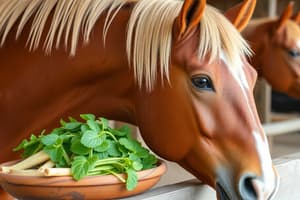Podcast
Questions and Answers
Why do horses require constant secretion of bile into the small intestine?
Why do horses require constant secretion of bile into the small intestine?
- To prevent colic and obesity
- To store excess bile for later use
- To regulate body temperature
- To aid in digestion and nutrient absorption (correct)
What is the primary source of energy for horses?
What is the primary source of energy for horses?
- Protein
- Vitamins
- Carbohydrates (correct)
- Fats
Why is consistent feeding important for horses?
Why is consistent feeding important for horses?
- To increase exercise tolerance
- To prevent hindgut upset
- To promote dental health
- To mimic natural grazing behavior (correct)
What can feeding too much concentrate feed without sufficient fiber lead to?
What can feeding too much concentrate feed without sufficient fiber lead to?
What is a common issue that poor teeth in horses can lead to?
What is a common issue that poor teeth in horses can lead to?
Why are minerals such as calcium and phosphorus vital for horses?
Why are minerals such as calcium and phosphorus vital for horses?
What is the main function of the horse's stomach?
What is the main function of the horse's stomach?
What is the primary purpose of the cecum in the horse's digestive system?
What is the primary purpose of the cecum in the horse's digestive system?
Which of the following is a key difference between horses and ruminant animals like cows?
Which of the following is a key difference between horses and ruminant animals like cows?
What is the primary function of the small intestine in horses?
What is the primary function of the small intestine in horses?
Which of the following is a common dietary issue that can affect horses?
Which of the following is a common dietary issue that can affect horses?
What is the importance of understanding the horse's digestive system and nutritional requirements?
What is the importance of understanding the horse's digestive system and nutritional requirements?
Study Notes
Equine Nutrition: Understanding the Digestive System, Essential Nutrients, and Feeding Practices for Horses
Equine nutrition plays a crucial role in maintaining the health and performance of horses. Understanding the complexities of the equine digestive system, knowing what nutrients are essential for horses, and implementing appropriate feeding practices can help prevent numerous health issues.
Digestive System of Horses
Horses are non-ruminant herbivores and hind-gut fermenters, meaning their digestive tract functions differently compared to other species. The digestive system includes several parts:
- Mouth: The first point of entry for food, where it undergoes initial mechanical breakdown through the action of grinding molars and chewing.
- Esophagus: Transports food to the stomach.
- Stomach: Secretes hydrochloric acid (HCl) and pepsin to begin breaking down food. Horses cannot regurgitate, making vomiting impossible in case of overeating or ingesting poisonous substances.
- Small Intestine: Up to 70 feet long in medium-sized horses, mainly responsible for digestion and absorption of nutrients, including carbohydrates, proteins, fatty acids, vitamins, and minerals.
- Large Intestine: Consists of four parts: cecum, colon, small colon, and rectum. The cecum, particularly in medium-sized horses, can hold up to 18 gallons (70 liters) of material and serves as part of the horse's hindgut fermentation process. Unique in horses is that unlike other mammals, they lack a gall bladder, requiring constant secretion of bile into the small intestine.
Essential Nutrients for Horses
To maintain optimal health and performance, horses require six classes of nutrients:
- Water: Crucial for hydration, digestion, transporting nutrients, and maintaining body temperature.
- Carbohydrates: The primary source of energy for horses, found in forage and grain feeds.
- Protein: Important for muscle growth, maintenance, and repair, especially during periods of growth, pregnancy, and lactation.
- Fats: Provide energy, aid in digestion and nutrient absorption, and support immune function.
- Vitamins: Micronutrients essential for various bodily functions, including bone growth, muscle tone, and immune response.
- Minerals: Including calcium, phosphorus, and trace elements, vital for bone structure, skeletal muscle, nerve conduction, and fluid balance.
Feeding Practices for Horses
Proper feeding practices play a significant role in ensuring horses receive balanced nutrition:
- Consistent Feeding: Feeding small meals frequently throughout the day can reduce the incidence of colic and promote better digestive health.
- Access to Free-choice Water: Ensure horses have continuous access to clean drinking water to support digestion, hydration, and overall health.
- Slow Feeding: Using hay nets to slow consumption helps mimic natural grazing behavior and supports the horse's digestive system.
Common Equine Dietary Issues
Understanding the equine digestive system and essential nutrients can help prevent common dietary issues:
- Overfeeding: Feeding too much concentrate feed without sufficient fiber can lead to colic, obesity, laminitis, and decreased exercise tolerance.
- Improper Digestive System Function: Inadequate fiber intake can cause hindgut upset, predisposing horses to colic problems and nutritional imbalances.
- Dental Problems: Poor teeth can result in decreased feed intake, weight loss, quidding, choke, and impaction colic.
In conclusion, understanding the complex interplay between the digestive system, essential nutrients, feeding practices, and potential issues can significantly impact a horse's health and welfare. By providing adequate nutrition tailored to the individual horse's needs, owners can help ensure their animal remains healthy and performs optimally.
Studying That Suits You
Use AI to generate personalized quizzes and flashcards to suit your learning preferences.
Description
Test your knowledge on the equine digestive system, essential nutrients, feeding practices, and common dietary issues affecting horses. Learn about the functions of different digestive organs, vital nutrients like protein and minerals, and best feeding practices to maintain horse health.




